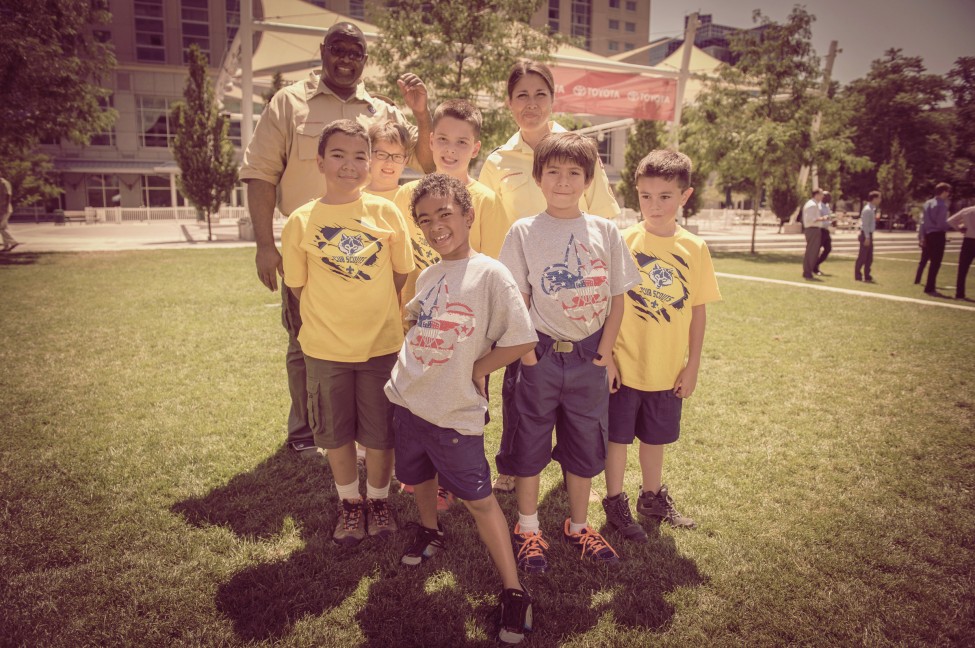
How Scouting Promotes Positive Character Development
From the life-saving Scout stories you hear in the news to the firsthand Scouting testimonials parents share about their kids, we all believe that Scouting builds leaders and shapes character in its members.
But, remember, the mission of the Boy Scouts of America is to prepare young people to make ethical and moral choices over their lifetimes. That means the BSA continues to deliver upon its mission for years and even decades after a young person leaves the program, when a former Scout makes an honorable choice, fulfills his or her duty, or shows trustworthiness, loyalty, helpfulness, or any other point in the Scout Law or Oath. Scouting’s mission is a long-term proposition, an investment in the future.
What if we came to better understand, scientifically and empirically, the effectiveness that Scouting has in fostering positive character development in young people? At the 2015 Top Hands conference for Scouting professionals last week, youth expert Dr. Richard M. Lerner gave us a glimpse at exactly that.
Working with the Cradle of Liberty Council and funded by the John Templeton Foundation, Dr. Richard M. Lerner and his team at Tufts University worked to answer that question and many others through research which measured the character attributes of both Scouts and non-Scouts. The goal of the study was to better understand the character development of Scouts while it was happening, rather than relying on former Scouts to recount their memories, or only measuring current Scouts at one point in time.
The project surveyed nearly 1,800 Cub Scouts and nearly 400 non-Scouts under age 12 as part of a “mixed methods” study, incorporating both interviews and survey data.
Data were collected in five waves over the two-and-a-half-year period, and critically, as often as possible, the same Scouts were surveyed at each data point. Here, the researchers were able to see individual change in hundreds of boys and to assess when, and to what extent, character development was taking place.
Positive Character in Scouting
When conducting research, it’s important to account for factors like age, race, socioeconomic status, and other demographic characteristics, because we want to know any change present can be attributed to Scouting.
Taking all of these elements into consideration, Dr. Lerner’s research showed that at Wave 1, there were no significant differences between Scouts and non-Scouts. Were the Scouts already higher in character, we would have instead shown that Scouting merely attracts good kids, rather than makes them. Instead, the Scouts and non-Scouts were similar enough “to compare apples to apples” moving forward.
What did we find? By two and a half years in the study, the boys in Cub Scouts reported significant increases in cheerfulness, helpfulness, kindness, obedience, trustworthiness and hopeful future expectations. There were no significant increases reported among non-Scouts.
These attributes were measured on a five-point scale (from “Not at all like me” = 1 to “Exactly like me” = 5) using statements such as:
- Cheerfulness – ‘‘I am happy’’ and ‘‘I smile a lot’’
- Kindness – ‘‘I’m kind to other kids’’ and ‘‘When my friends are upset, I try to make them feel better’’
- Hopeful future expectations – ‘‘I will have a happy family’’ and ‘‘People will think I am a good person’’
- Trustworthiness – ‘‘I can be counted on to tell the truth’’ and ‘‘I take responsibility when I make a mistake’’
- Helpfulness – ‘‘I help people in my family’’ and ‘‘I help my friends’’
- Obedience – ‘‘I act the way I am supposed to’’ and ‘‘I do what my parents say’’
Further, when asked what was most important to them, Scouts were significantly more likely than non-Scouts to choose helping others or doing the right thing as compared to being smart, being the best, or playing sports. This shows that boys in Scouts are more likely to embrace prosocial values than non-Scouts. Youth who participated in both sports and Scouting were also more likely to choose these same prosocial values than those who only played sports.
More Time in Scouting, Better Character Development
That’s just one finding specific to those in Cub Scouts. A 2012 independent research study of Scouts conducted by Baylor University found that Eagle Scouts are more likely to volunteer, donate money to charity, vote, and work with others to improve their neighborhood than men who have never been in Scouting. They were also found to be more goal-oriented, have higher levels of planning and preparation skills, and be more likely to take a leadership position at work or in their local communities.
Most of us would not be surprised to associate those types of behaviors with Eagle Scouts. But what about Scouting in general? The research has shown that more time spent in Scouting results in better character development. In fact, the Tufts study investigated the effects of intensity (frequency of attendance), duration (years in the program), and engagement (interest, effort, and enjoyment in participation) with following results:
- Scouts who attend meetings regularly reported higher trustworthiness, helpfulness, kindness, and thriftiness, higher levels of hopeful future expectation and goal-setting, better grades, and a greater connection to nature as compared to Scouts who sometimes or rarely attend.
- As Scouts’ tenure in the program increases, they report higher levels of trustworthiness, intentional self-regulation, hopeful future expectations and better grades.
- Scouts who are engaged in Scouting programs – those who enjoy camping, have fun at meetings, wear the uniform, have friends in Scouting, have advancement goals and have family members participating – are more cheerful, helpful, kind, hopeful about the future and have higher intentional self-regulation.
Scouting Is For Everyone
So there you have it! By two and a half years after the beginning of the study, Cub Scouts were already showing increases in six out of ten measured character attributes compared to their non-Scout peers. Just imagine the results after more time in the program, or as Boy Scouts! Cub Scouts were also significantly more likely to embrace prosocial values such as “helping others” or “doing the right thing” than non-Scouts. Finally, the length of time registered as a Scout, frequency of attendance at meetings, and most importantly, a high level of interest, effort and enjoyment – that is engagement – in programs promote character development among Scouts.
More Information Is Heading Your Way
In the coming weeks, we’ll share additional information further discussing Dr. Lerner’s research – perfect for presentations to donors, parents, and volunteers. But for now, what are some ways you see Dr. Lerner’s research could be effectively used for your council’s recruitment and retention efforts? Share in the comments below. More information, including slideshows and scholarly publications are also available at the research study website at http://www.tuftscampstudy.com/.



